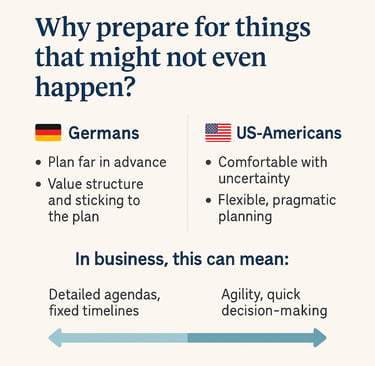Why prepare for things that might not even happen?
6/30/2025
Ask this question to a German or a US-American, and you’re likely to get two very different answers- shaped not just by personality, but also by cultural perspective.
🇩🇪 Germans typically prefer to plan far in advance. They value structure, clarity, and sticking to the plan once it’s set. Planning provides a sense of security, and unexpected changes are often viewed as disruptive.
🇺🇸 US-Americans, by contrast, are often more comfortable navigating uncertainty. Planning tends to be more flexible and pragmatic, with a willingness to adapt quickly as situations evolve.
💼 In business, this can play out in various ways:
• A German team may expect detailed agendas, fixed timelines, and clear procedures.
• A US-American team might prioritize agility, quick decision-making, and “figuring things out as we go.”
Neither approach is right or wrong- but when international teams work together, misunderstandings can arise if these preferences aren’t acknowledged and managed.
🌍 Being aware of how different cultures handle planning and uncertainty helps build mutual understanding, reduce friction, and improve collaboration across borders.
💡What’s your experience with this? Have you seen these planning styles clash- or complement each other?


Follow me on
Contact
Connection
DiverseCultureSolutions@aol.com
Mobile: 248-824-4352
© 2024. All rights reserved.
